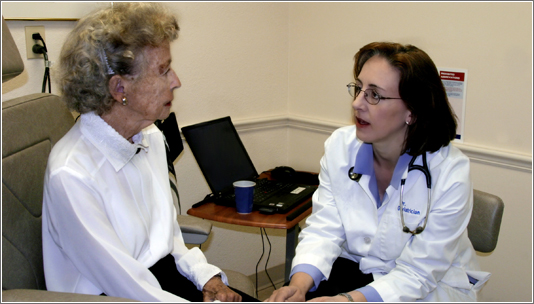

Geriatricians or other Practitioners in Aging Medicine
January 16, 2018 | by the National Care Planning Council
Geriatricians are doctors or nurse practitioners who specialize in treating older people. In seeking medical professional help, the elderly or their family should make an effort to find geriatric care specialists in their area. If that is not possible an effort should be made to locate a geriatric clinic in the area.
Geriatric clinics are becoming more common, and even though the doctors who staff them may not always be geriatric physicians, providers in the clinic are likely to be well aware of the problems associated with treating elderly people. Many geriatric clinics include a team of specialists to help older people. Here are some of the specialists who may be available in a geriatric clinic:
- Medical doctor conversant with healthcare issues for seniors
- Nurse
- Social worker
- Nutritionist
- Physical therapist
- Occupational therapist
- Consultant pharmacist
- Geropsychiatrist
If there are no geriatricians or geriatric clinics in the area, an attempt should be made to find those doctors who specialize in elderly care. This can be done by making phone calls to various doctors’ offices or by checking online. It is to the older person’s benefit to find a doctor who understands aging and how to treat older people. Proper geriatric health care might even help relieve the amount of care needed for an older person by improving health and reducing disabilities.
House Call Doctors
Many doctors are returning to the practice of medicine a hundred years ago and are making house calls. Health insurance plans, including Medicare, will now reimburse a doctor and possibly a staff member, if test equipment is involved, to visit homebound patients in their homes.
To qualify for a home visit, the patient must experience great difficulty in leaving the home in order meet with the doctor in his or her office. This does not, however, mean the care recipient need be totally disabled. It simply means that transportation requirements or help needed to get to a doctor might be very expensive or difficult to provide or the patient's safety might be jeopardized by leaving the home.
Doctors are willing to visit in the home and provide service because they are paid more money by health insurance providers to compensate them for their time and their loss of efficiency in meeting patients in their offices. Likely, the insurance providers reason that the additional cost of meeting with patients at home, before major medical problems evolve, is more cost effective than paying for ambulances and treatment in emergency rooms.
